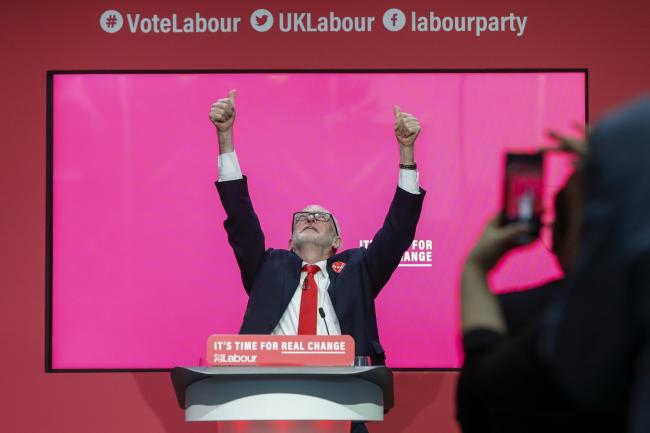(Bloomberg) -- U.K. opposition leader Jeremy Corbyn sought to eclipse Prime Minister Boris Johnson by unveiling plans for an extra 83 billion pounds ($108 billion) of day-to-day spending if the Labour Party wins the Dec. 12 general election.
The figures, set out in Labour’s election manifesto published on Thursday, would come on top of the additional tens of billions of pounds that the party is proposing to plow into infrastructure projects over the next five years.
In theory, the commitments should be neutral for borrowing as they are fully covered by higher taxes on companies and top earners. Labour reckons the current budget should be in balance by 2023-24, meaning revenue and non-investment spending are at broadly the same level.
However, there will inevitably be doubts about whether a Labour government can raise as much as it thinks. The estimates include 6.2 billion pounds from cracking down on tax avoidance and evasion, a commitment that has historically delivered less than promised. There’s also 5.4 billion pounds from higher levies on the top 5% of taxpayers, above the amount the Institute for Fiscal Studies deems likely.
Labour also banks 5 billion pounds in revenue returns from its plan to increase investment by 55 billion pounds a year during its first term, more than doubling the current level of net investment. That’s based on the evidence that spending on infrastructure provides a far greater boost to the economy than government money spent on wages and public services.
Step Up
The projections are a step up from the commitments made before the 2017 election, when Labour planned increases of less than 50 billion pounds, and come on top of the extra 12 billion pounds or so of day-to-day spending promised by the Conservatives in September for the coming fiscal year.
The manifesto includes a fiscal credibility rule that commits a Labour government to “eliminate the current budget deficit by the end of the rolling five-year period,” while improving the strength of the public balance sheet and keeping debt-interest payments below 10% of tax revenue. However, the rule can be suspended if the Bank of England restarts quantitative easing.
Labour has already suggested a number of changes at the BOE, and this latest idea may prove controversial if it’s seen a way of dragging the independent central bank into the fiscal policy debate -- an arena officials have previously been at pains to avoid.
Labour’s spending include more money for schools and public-sector workers, the abolition of university tuition fees and a 6 billion-pound boost for the National Health Service that tops the investment promised by the Conservatives.
More than 5 billion pounds of revenue would come from reversing cuts to inheritance tax, imposing a levy on banks and second homes, and slapping value-added tax on private-school fees.

